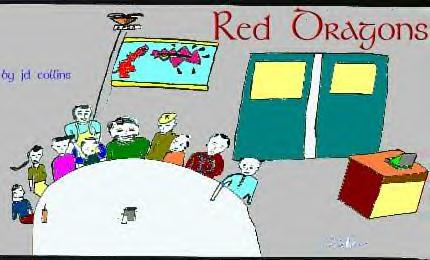

| Introduction: The
Man and the myth The Peconic Street Literary Society started its focus
on Arthurian Literature as part of its search for the great American epic
because of the legend's unique impact on the formation of the country.
An epic is a struggle of the warrior, representing the cultural values of the society, in heroic conflict with its enemies. It differs from the standards of Western scientific history set by Herodotus and Thucydides in that the teaching point is moral rather than factual. A scientific measure of accuracy has never been imposed upon a legend. Important in the Western epic is the concept of victory in defeat and defeat in victory. There are many American folk heroes capable of being ensconsed in an epic. King Philip, Hiawatha, Pontiac, Joseph Brandt, Cocheese and Geronomo...., the greatest American leaders never lived in the White House. The History Channel's lead to its series 'How America was Lost' tells us, that they never lived in any house at all. | ||
Winners write the history; losers quietly fade away. Or is it just the opposite, as the magic of epic story telling posits. The conqueror is the captive of his conquest. Arthur surmounts this pith apothogem. No British King claims the world recognition of Arthur; no monarch's passing has been mourned so long; no other monarch has captured the imagination even in these jaded times of authors, thinkers and actors. His words "We will return" were reechoed by MacArthur in a defiant retreat. Yet historians debate his very existance. The fabric of the legend are well known. In a crisis a young warrior was selected to lead the remnants of Gaulo-Roman Latin. In nine great battles he stablized the realm. Restored peace masks uneasy division. Christianity struggles to suppress paganism; the Queen cannot produce an heir. Arthur is guilty of fathering a son out of wedlock, perhaps in a pagan ritual with a Celtic High Priestess. Arthur is forced to banish his wife and slay his finest knight when indescretion is revealed. The last conflict fought against his illegitimate son Mordered finds Arthur without his Queen or sturdiest lance. In victory Arthur is mortally wounded, but darkness is temporarily restrained. The legend's long standing appeal is its story of life that keeps repeating. There is something in it for all ages. To the middle ages Arthur was the warrior king who engaged in personal combat. To the church Arthur was a defender of the faith, a promoter of Christianity to hostile pagani. To the American Revolutionaries in the Age of Revolution, Arthur was a democratic leader who was after all only one vote on his council. New Age sees in Arthur's adherence to the 'Old One's' the persistency of belief in the natural religion. Said Celtophile Joseph Campbel, "Arthur, Arturo, Joan D'Arc, Ursus the bear god, existence, reality, life and death, debt and repayment... Feminists should be cheered by Celtic duality in which society is both a patriarchate and a matriarchate at the same time... Historians still debate Arthur and Celtic resistance to the Saxon onslought. But where would the world be if there were no Arthurs and only Mordreds? The Time of Arthur The scholar Gildeas writing about 550AD claimed that Arthur had reigned 50 years before the writing. This would put Arthur's reign before 500AD, 25 years after the fall of the Empire in the West. The Romans had invaded Briton under Julius Caeser, but did not complete
the conquest until the time of Claudius. Following copnquest, Queen
Bodicca (Eng Veronica or Victoria) led the Celts in a bloody uprising and
sacked Londinium (London). In victory the Romans proved to be capable of
an accomodation with the defeated Celts and applied Roman law in the
cities leaving the Celts free to govern themselves without. By the 4th Century AD the Empire was showing signs of crumbling. The
Romans proved to be capable only of fighting each other in disasterous
civil wars. To win the civil war Constantine Magnus (Konstantos Meyali)
withdrew forces from the province. Briton was at the mercy of maruading
barbarians. In the early 5th Century the regent Stilichio restored order
to the province. However Rome, more concerned with the Franks who had taken to horse and
with the Goths who invaded the Italian heartland of the empire, withdrew
troops from Briton and appointed Vortigen Britwalder. Taken captive
at a parlay with Saxon invaders, Vortigen was executed in a pagan ritual.
Vortigen and the facts of his execution are generally accepted as
historically valid. Rome continued its steady decline. By mid 5th century Emperors changed
so frequently that the court poet refused to commemorate further
ascensions to the throne. In 476 the last Emporer was killed by German
guards. According to Celtic historians, Vortigen was succeeded by Ambrose. In
typical Celtic duality, though a devout Christian and saintly ruler,
Ambose rose according to a Druid's vision of the Red Dragon of the Celts
slaying the White Dragon of the Saxons. When Ambrose died childless the
kingdom fell to Uther and then to Arthur.
| |||
|
| |||
|
Introduction to the Legend Christian and Pagan Elements Masons in The Arthurian Legend The Arthurian Legacy |
RPPS Cultural Services Greetings in Fullosia Military Police Blotter Cheerio! Fullosia Press | ||
|
| |||
| This web site is hosted by the gentlemen of the Rockaway Park Philosophical Society www.onamission.com. Join with us in the Fullosia!. |